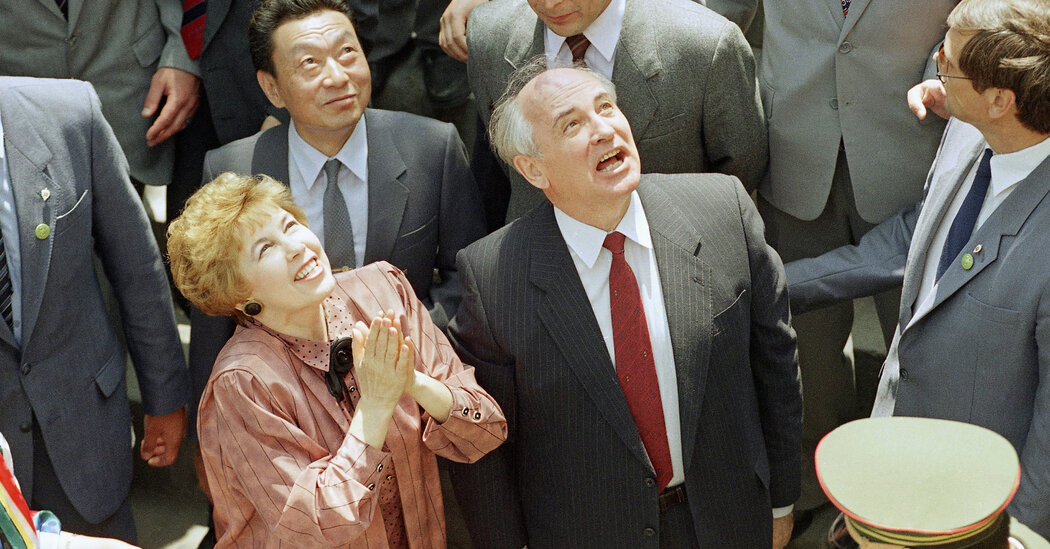Mikhail S. Gorbachev, lionized within the West, idolized by protesting Chinese language college students in Tiananmen Sq. however despised by many Russians for what they noticed as his destroying their nation, had fallen removed from grace and will barely include his fury once I first met him in 1992, quickly after arriving in Moscow as a correspondent.
His successor within the Kremlin, Boris N. Yeltsin, had simply confiscated Mr. Gorbachev’s limousine and evicted his analysis basis from its Moscow workplaces in a match of vengeful spite — indignities that challenged not solely his amour propre but additionally his lofty and well-deserved self-image as a frontrunner who had modified the world.
President Yeltsin, Mr. Gorbachev fumed, referring to himself within the third particular person as he typically did, had launched into a petty and fruitless mission to “put Gorbachev in his place.” That, he insisted, would by no means occur.
Mr. Gorbachev’s tragedy, nevertheless, is that it did.
Within the greater than three a long time since he resigned as president of the Soviet Union on Dec. 25, 1991 — minutes earlier than his nation ceased to exist — he and his work have all been put of their place.
The following time I noticed Mr. Gorbachev was almost a decade later at a cocktail party hosted by a Russian banker at a grand villa in a forest exterior Paris. He was seated subsequent to Fanny Ardant, a French actress whose movies he appeared to know nicely and whose gushing admiration briefly lifted his in any other case glum temper.
An obscure former Okay.G.B. spy named Vladimir V. Putin had simply taken energy in Moscow, and Mr. Gorbachev, towards whom the Okay.G.B. had staged a failed coup in August 1991, had few followers left, not less than at house in Russia, and was once more in a bitter temper.
By the point his loss of life was introduced on Tuesday, the hopes, liberties and chaos he had bestowed on Russia throughout his six years in energy, from 1985 to 1991, by means of his signature insurance policies of “glasnost” and “perestroika” had all been vanquished, first by well-liked revulsion on the turmoil of the Nineteen Nineties after which by the 22-year rule of Mr. Putin, who got here to energy on the eve of the brand new millennium vowing to “restore order.”
The cacophonous information scene created throughout Mr. Gorbachev’s tenure has vanished, changed by the monotonous din of Kremlin-scripted propaganda. Aggressive elections, launched by Mr. Gorbachev to prod a sclerotic Soviet forms into serving pursuits apart from its personal, have once more turn out to be empty rituals choreographed by the Kremlin. Mr. Gorbachev’s imaginative and prescient of a “frequent European house” stretching from Vladivostok to Lisbon has been changed by a Russia more and more remoted from the remainder of Europe because it pursues a vicious warfare of aggression towards Ukraine, its neighbor.
When Mr. Gorbachev visited Beijing in Could 1989, scholar protesters in Tiananmen Sq. hailed the Soviet chief as a hero, parading by means of the streets of Beijing with banners asking, “The place is China’s Gorbachev?” His work in Moscow, they believed, supplied hope for the concept autocracy may mellow and chorus from violence.
That every one ended lower than a month later with the Tiananmen bloodbath of June 4.
Mr. Gorbachev, who had largely averted violence in coping with protests within the Soviet Union, by no means publicly condemned and even questioned the Chinese language Communist Social gathering’s choice to name within the army.
However, as China’s economic system took off and Russia’s sank right into a deep gap, the lesson, for a lot of Chinese language and in addition Russians, together with Mr. Putin, was a message enshrined in essentially the most enduring of Chinese language political slogans: “Stability Is All the pieces.”

